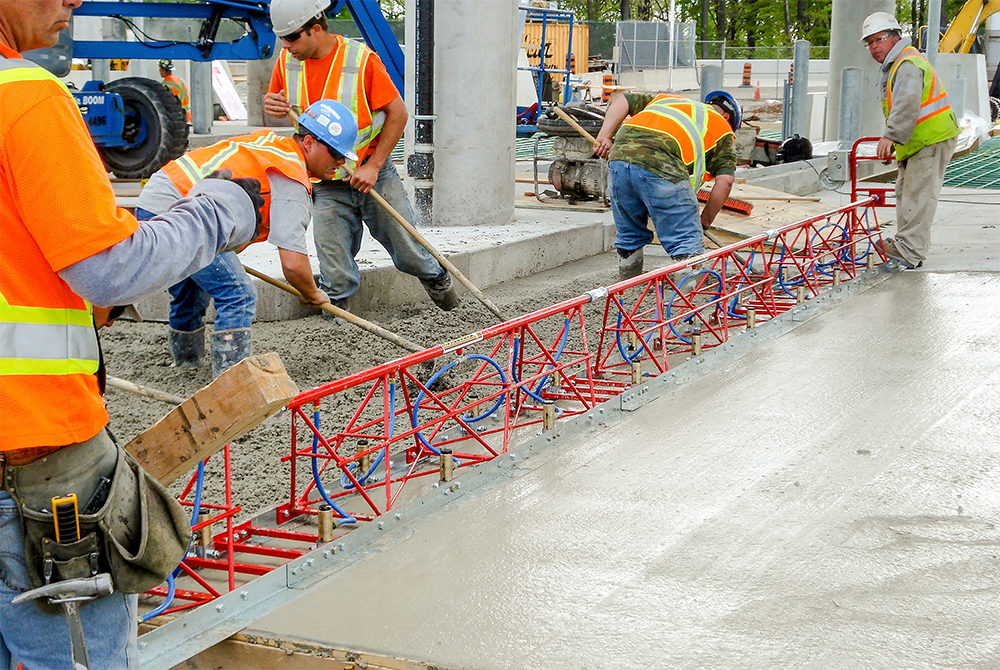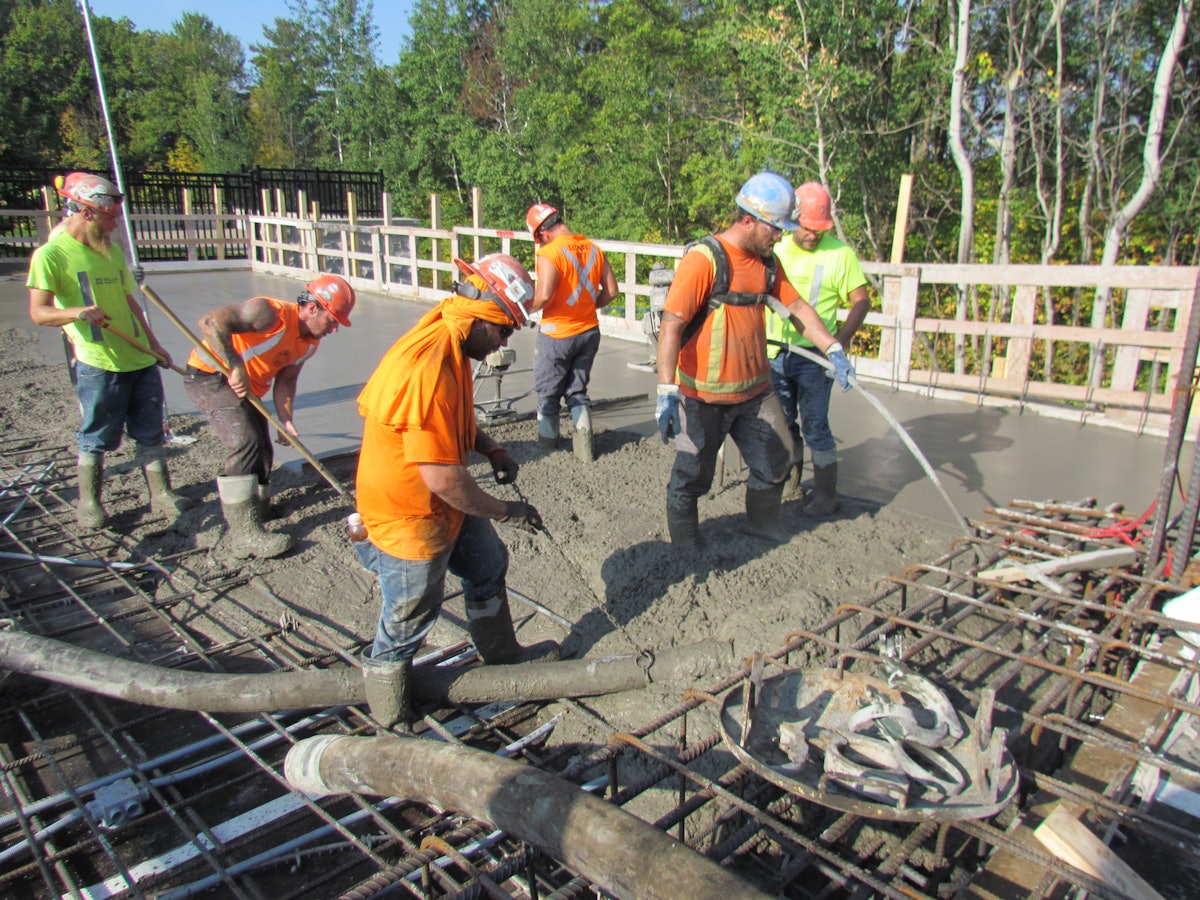7 Proven Strategies to Maximize Project Value with West Coast General Engineering Concrete
The Crucial Role of Concrete Foundation in Structural Integrity and Longevity
When it involves building a residential property, the foundation is more critical than you may think. Concrete foundations provide unrivaled toughness and sturdiness, guaranteeing your structure can withstand numerous environmental challenges. Without a strong base, you risk possible problems like changing or splitting, which can jeopardize security and value. Recognizing the subtleties of concrete foundations can be the trick to protecting your financial investment for several years ahead. What should you take into consideration next?
Comprehending the Significance of Concrete Foundations
Concrete foundations are vital to the overall stability of any type of framework, as they offer the crucial assistance needed to endure different tons and environmental problems. When you consider developing a home or a commercial space, the foundation is the initial point you ought to take into consideration. It functions as an obstacle against dampness, protecting your building from water damages. A well-placed concrete structure additionally protects against settling and moving, which can result in fractures in walls and floorings. You'll desire to assure that the foundation is correctly created and strengthened, as this impacts the long life of your structure. Additionally, a strong structure can boost energy performance by minimizing air leakages. Remember, overlooking the value of a concrete structure can bring about expensive repair services down the line. So, spending in a top quality structure upfront is crucial for the integrity and toughness of your structure.
Advantages of Concrete Structures for Architectural Integrity
While many elements add to a structure's architectural integrity, concrete structures offer unparalleled toughness and stamina. You'll appreciate that concrete can withstand severe climate condition, withstanding both dampness and temperature variations. This durability indicates your structure is much less most likely to experience cracking or shifting gradually, which can compromise its safety.Additionally, concrete's integral weight provides a solid base, protecting against motion during natural occasions like earthquakes or floodings. When you select a concrete foundation, you're additionally going with low upkeep; unlike timber, it will not rot or bring in bugs, saving you time and cash in repairs.Moreover, concrete's fire resistance provides added safety and security, ensuring your framework can sustain high temperatures without considerable damage. In general, spending in a concrete structure suggests you're prioritizing the lasting security and integrity of your structure, making it a smart selection for any kind of building job.
Common Types of Concrete Foundations
When it comes to constructing foundations, comprehending the usual sorts of concrete structures can assist you make notified choices for your project. The most common types consist of slab-on-grade, crawl area, and full basement foundations.A slab-on-grade foundation is a simple, cost-effective option, where a thick concrete piece is poured directly on the ground. This kind functions well in warm climates, as it minimizes warm loss.Crawl space foundations boost the home somewhat above ground, enabling ventilation and accessibility to plumbing and electric systems. This layout can aid avoid dampness issues.Full basement foundations provide additional living or storage area while giving outstanding structural assistance. They need even more excavation and are generally utilized in chillier environments to stop frost heave.
Aspects to Consider When Designing a Concrete Structure

Best Practices for Putting Up Concrete Foundations
When you're mounting a concrete foundation, proper site preparation is crucial to assure security (West Coast General Engineering industrial concrete). You'll likewise need to comprehend support methods to improve strength and resilience. Do not neglect the curing process, as it plays a basic function in accomplishing a solid structure.
Website Prep Work Significance
Although it may seem uncomplicated, correct site prep work is vital for ensuring a solid and durable concrete foundation. Beginning by removing the location of any type of debris, greenery, or natural product that might endanger the foundation's stability. Next, analyze the soil kind and compaction; you may require to excavate or add products to develop a secure base. Degree the ground to guarantee also weight distribution and avoid working out problems in the future. Setting up proper water drainage systems is additionally vital to prevent water build-up, which can deteriorate the foundation with time. Mark out the foundation's dimensions accurately to direct the putting procedure. By adhering to these actions, you'll establish the stage for an effective concrete structure that stands the test of time.
Reinforcement Techniques Clarified
Once the website is correctly prepared, the next action in guaranteeing a tough concrete foundation involves applying effective reinforcement techniques. You must begin by utilizing steel rebar, which supplies tensile stamina and helps avoid breaking. Lay the rebar in a grid pattern, ensuring it rises making use of spacers to preserve appropriate protection. Additionally, take into consideration utilizing wire mesh for added support, especially in areas based on hefty lots. Do not forget to tie the rebar junctions securely with wire. For bigger foundations, fiber support can enhance sturdiness, decreasing the danger of contraction fractures. Always follow local structure codes and guidelines to make certain compliance. By using these reinforcement strategies, you'll considerably enhance your structure's stamina and longevity, laying a solid foundation for your framework.
Healing Refine Basics
To assure your concrete structure treatments appropriately, it is very important to maintain appropriate dampness and temperature problems promptly after putting. Beginning by covering the surface with a wet cloth or plastic sheet to keep moisture. This maintains the concrete hydrated, avoiding cracks and making sure stamina. You need to also keep track of the temperature level; ideal healing conditions are in between 50 ° F and 90 ° F. If it's as well hot, haze the surface area on a regular basis to prevent quick evaporation. For winter, consider utilizing protecting coverings to preserve warmth. Go for a treating period of at least seven days, as this is vital for ideal stamina development. By adhering to these best practices, you'll boost your structure's toughness and durability, guaranteeing architectural integrity for several years to come.
Upkeep of Concrete Structures for Durability
To maintain your concrete structure strong and enduring, routine examinations are essential. You must additionally ensure reliable drain options remain in place to avoid water damage. If you identify any type of splits, resolving them without delay will save you from bigger troubles down the line.

Normal Examinations and Analyses
While routine examinations and evaluations could appear like a task, they're important for maintaining the stability of your concrete structure. By routinely looking for splits, shifts, or indications of wear, you can catch prospective concerns prior to they intensify into costly repair services. Search for any type of water merging around the structure or uncommon settling, as these can indicate underlying issues. It's likewise smart to keep track of any kind of modifications in your home's structure, like doors that stick or windows that don't open smoothly. Maintaining a document of your evaluations assists track adjustments gradually, enabling proactive maintenance. Eventually, these assessments guarantee your structure remains stable, supporting the durability and safety of your entire framework. Do not ignore this important aspect of homeownership!
Efficient Drain Solutions
Normal assessments can disclose problems like drainage issues that could compromise your concrete structure's stability. To prevent water build-up, assure your rain gutters and downspouts direct water away from the foundation. Installing French drains can properly redirect surface area and groundwater, minimizing stress on your structure walls. Furthermore, grading the dirt around your home aids assure that water moves away, instead than pooling near your foundation.Consider making use of sump pumps in locations vulnerable to flooding, as they actively eliminate excess water. On a regular basis look for obstructions in drain systems and clear them immediately. You'll protect your foundation's honesty and longevity by taking these aggressive measures. Remember, reliable water drainage options are necessary for keeping a strong, durable concrete structure.
Prompt Split Repairs
When you notice splits in your concrete foundation, resolving them promptly is essential for preserving its longevity. Tiny splits can promptly advance right into larger issues, compromising the structural stability of your home. Consistently inspect your foundation for signs of damage, such as straight or upright fractures. If you spot any, do not wait-- repair them immediately. You More Bonuses can make use of epoxy look at this site shots or concrete patching compounds, which are efficient for securing splits. Constantly follow the supplier's directions and consider getting in touch with a specialist for significant damage. Remember, timely fixings not just improve your foundation's durability however additionally conserve you money over time by preventing extra substantial repairs down the line. Keep aggressive, and your structure will remain solid and protected.
Dealing With Common Issues With Concrete Structures
Concrete structures can face various problems in time, making it important to recognize and resolve them without delay. One of one of the most common troubles is splitting, which can happen because of temperature changes or settling dirt. If you observe fractures, it's necessary to examine their dimension and depth; little splits can frequently be secured, while larger ones might call for expert evaluation.Water invasion is another major problem. Excess dampness can cause mold growth and architectural damage. Warranty appropriate drainage around your structure to minimize this danger. Additionally, look for indications of moving or bowing wall surfaces, as this can suggest underlying issues with your structure's stability.Regular assessments are fundamental to capture these problems early. If you detect any type of concerning indications, don't hesitate to consult a foundation expert. By remaining proactive, you can preserve the honesty and long life of your concrete structure, guaranteeing your home remains secure and secure.
Frequently Asked Questions
Just How Does Soil Type Influence Concrete Structure Performance?
Soil type significantly impacts concrete foundation efficiency. If you've got large clay, for example, it can cause changing and breaking. Sandy soil could lead to resolving. Comprehending your soil assists guarantee a secure foundation.
Can Concrete Foundations Be Fixed if Harmed?
Yes, you can fix broken concrete structures. Depending on the degree of the damage, techniques like epoxy injection or piece jacking can restore security. It's best to speak with an expert for reliable remedies.
What Is the Typical Life Expectancy of a Concrete Foundation?
A concrete structure commonly lasts 30 to 100 years, depending on variables like dirt problems, environment, and upkeep. You'll intend to keep an eye on it to assure it remains healthy throughout its life expectancy.
Are There Option Products to Concrete for Foundations?
Yes, there are alternatives to concrete for structures, like steel, hardwood, and even recycled products. Each option has one-of-a-kind benefits and drawbacks, so you ought to consider your project's particular requirements when selecting the best material.
Just How Does Environment Influence Concrete Foundation Longevity?
Climate significantly affects concrete structure toughness (West Coast General Engineering industrial concrete). Severe temperature levels, moisture, and freeze-thaw cycles can weaken the material, causing fractures and architectural issues. You must take into consideration click reference regional environment problems when intending your foundation to ensure long-lasting efficiency